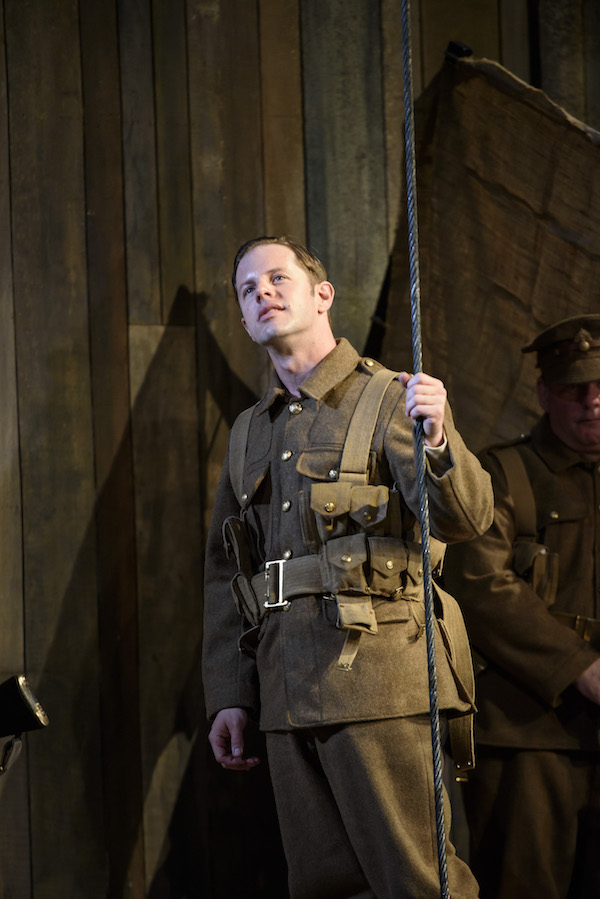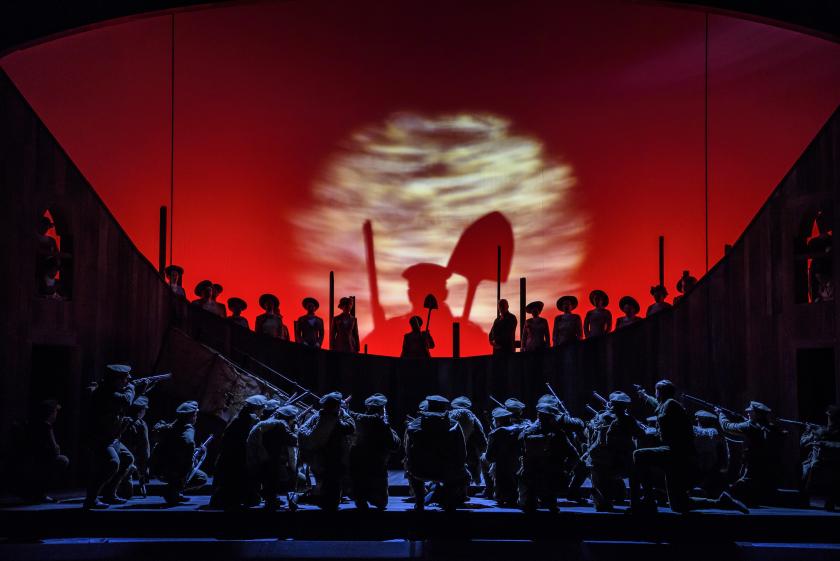War may be a dramatic affair for anyone involved in it, but staging it is another matter. In fact describing it satisfactorily at all needs either a Tolstoyan flair for the large canvas, or else a poetic genius for directing its force inwards, into self-reflection or religious contemplation or the kind of intense verbal music, rich in historical and literary allusion, that the great Welsh artist and writer David Jones made his own in his long, tragic prose-poem, In Parenthesis.
I can just about imagine an In Parenthesis opera in the form of a one-man show with the author seated on a wooden chair in the middle of an empty stage. To turn it into a narrative opera with a cast of thousands and the occasional nod in the general direction of Jones’s poetic soul, as Iain Bell has done to a commission from WNO, is surely asking for trouble. And trouble duly obliges.
The problem starts with the libretto by David Antrobus and Emma Jenkins, one of those patched-up texts that make you feel vaguely uncomfortable if you happen to know the original. The parentheses of Jones’s poem are really its entire reflective substance, flowing from a deeply personal, not to say arcane account of his own experiences as a private in the British army at Mametz Wood. Slipping them in as fragments in a stage action, however ritualised, risks a particular kind of decontextualized obscurity, and a sententiousness completely at odds with the elevated intricacy of Jones’s thinking.
 Perhaps more damaging is to portray Jones, in the character of John Ball, as a coward, who has to be virtually dragged on to the ship of embarkation to France and shoved screaming up the slope to Mametz. The John Ball of the poem is a self-confessed muddler, a poet after all, tender and unsuited to uniform; but never a coward. His deeper self is here partly transferred to the double act of a male and female chorus, a weary device one had hoped laid to rest by Britten’s Rape of Lucretia. How tiresome these figures are, standing around like grown-ups at a school play, patting the children on the head and occasionally explaining the blooming obvious to the stupid audience.
Perhaps more damaging is to portray Jones, in the character of John Ball, as a coward, who has to be virtually dragged on to the ship of embarkation to France and shoved screaming up the slope to Mametz. The John Ball of the poem is a self-confessed muddler, a poet after all, tender and unsuited to uniform; but never a coward. His deeper self is here partly transferred to the double act of a male and female chorus, a weary device one had hoped laid to rest by Britten’s Rape of Lucretia. How tiresome these figures are, standing around like grown-ups at a school play, patting the children on the head and occasionally explaining the blooming obvious to the stupid audience.
I could go on. But what matters is how Bell manages to transform this material into effective music drama. It’s a mixed, workmanlike achievement, better thought out technically than his overwritten score for A Christmas Carol. The voices have some of the space they (or to be exact, it) lacked there. And there is much lovely individual writing, especially for Ball himself, eloquently sung by the American bel canto tenor Andrew Bidlack (pictured above right), and an exquisite pastoral duet for Ball and his chum Lewis (Marcus Farnsworth), where Bell at last escapes from his tendency to overload the orchestral bass.
The big textures that mostly predominate are, I suppose, a natural outcome of the wide-angle approach to the subject. They focus on solid, occasionally brilliant, choruses on a crowded stage peopled, in David Pountney’s production, not only by soldiers but by what the librettists call a Greek-style “soundscape” chorus of women (Bacchantes?), who later reappear as the blasted Mametz trees of the familiar imagery, and later still as the “regenerated” forest, with Albert Herring flowery hats, all cleverly, even wittily, designed by Robert Innes Hopkins.
So far from the soldiers destroying the trees, it’s the trees that gobble up the soldiers, one by one, and to tell the truth somewhat laboriously, like the serial guillotining at the end of Poulenc’s Carmelites, and with about as much justice. But then if the Somme was among other things an environmental disaster, no doubt we are all to blame. Or is it just the girls taking their revenge for the boys’ silly wargames?
The two veterans squabble about their ancestry like pickled KundrysMuch of this plods along musically and dramatically somewhat in the manner of an oratorio, without much dramatic impulse, but with some fine choruses, notably a memorable setting of the Welsh song “Sosban fach”, sung and staged with uninhibited relish as the men sit in a French café waiting for the order to advance. Before this, there’s a striking cameo, straight out of the book, in which the two veterans, Dai Greatcoat (Donald Maxwell) and the Marne Sergeant (Graham Clark) squabble about their ancestry like a pair of pickled Kundrys (“I was with Abel when his brother found him under the green tree;” “I built a shit-house for Artaxerxes,” etc.).
Such moments might justify the general approach, even if they miss the intimacy and rich inwardness of the book. An opera, you could say, is not a book. But then not every book is, potentially, an opera, at least on the scale offered here. One is left with the best moments and some expert performances. Peter Coleman-Wright and Alexandra Deshorties are as good as possible as the bardic chorus, a shade patronising and even, in her case, possessively maternal, vocally excellent. Mark Le Brocq blusters efficiently as Sergeant Snell until his head is blown off, and there are good vignettes from George Humphreys as the fated, helpless Lieutenant Jenkins, and Joe Roche and Martin Lloyd as a duo of what one might call disposable privates.
Carlo Rizzi conducts this occasionally constipated score with due dedication. Bellini it isn’t. But then come to think of it, Bell, who writes fluently for the voice, might pick up a lesson from his near namesake about keeping even this superb orchestra more firmly in its place















Add comment